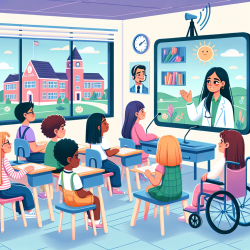In recent years, the educational landscape has witnessed significant transformations, with online therapy services emerging as a crucial component of school support systems. As schools increasingly integrate technology into their curriculums, the role of online therapy has expanded, offering numerous benefits to students and educators alike. This blog explores how online therapy is making a difference in schools, particularly in special education.
The Growing Need for Online Therapy in Schools
The demand for mental health support in schools has never been higher. With students facing unprecedented challenges due to the global pandemic and other stressors, providing accessible mental health services is essential. Online therapy offers a flexible and effective solution, allowing students to receive the help they need without leaving the school environment.
Key Benefits of Online Therapy Services
- Accessibility: Online therapy eliminates geographical barriers, making it easier for students in remote or underserved areas to access quality mental health care.
- Convenience: Virtual sessions can be scheduled around school hours, minimizing disruptions to students' academic schedules.
- Anonymity: Some students may feel more comfortable discussing sensitive issues in a virtual setting, leading to more open and honest communication.
- Cost-Effectiveness: Online therapy can reduce costs associated with transportation and on-site facilities, making it a budget-friendly option for schools.
The Impact on Special Education
For students receiving special education services, online therapy can be particularly beneficial. Many children with disabilities require specialized support that may not be readily available in their local area. Online platforms provide access to a wide range of specialists who can offer tailored interventions and strategies to meet each student's unique needs.
This approach not only supports academic achievement but also addresses behavioral and social challenges. By integrating online therapy into their educational plans, schools can create a more inclusive environment where all students have the opportunity to thrive.
Success Stories: Real-World Examples
Schools across the globe are already witnessing the positive effects of incorporating online therapy services. For instance, TinyEYE Therapy Services has partnered with numerous educational institutions to provide virtual speech-language pathology and occupational therapy. Their innovative approach has resulted in improved student outcomes and increased satisfaction among parents and educators.
Implementing Online Therapy: Best Practices
To maximize the benefits of online therapy services, schools should consider the following best practices:
- Comprehensive Training: Ensure that educators and staff are trained to facilitate virtual sessions effectively.
- Parental Involvement: Engage parents by keeping them informed about their child's progress and involving them in the therapeutic process.
- Regular Assessment: Continuously evaluate the effectiveness of online therapy interventions and make necessary adjustments to meet student needs.
- Collaboration: Foster collaboration between therapists, teachers, and administrators to create a cohesive support network for students.
The Future of School-Based Therapy
The integration of online therapy into school systems is poised to grow as more institutions recognize its potential benefits. By embracing this innovative approach, schools can enhance their support services and contribute to better mental health outcomes for students. As we continue to navigate an ever-changing educational landscape, online therapy remains a vital tool for fostering resilience and well-being among young learners.
For more information on effective strategies for balancing work-life demands in education, please follow this link.










